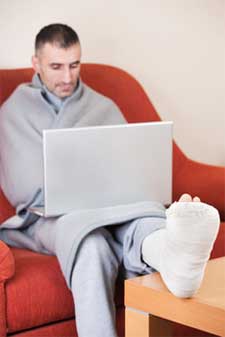If you have slipped and fell at a business or on someone else's property, you might be eligible for compensation. Slip-and-fall accidents are a form of personal injury law. To successfully win a slip-and-fall personal injury claim, your fall must have resulted not from your own carelessness, but from slippery floors or objects in the middle of the floor. Many factors are taken into consideration when filing a personal injury claim after a slip and fall, and a personal injury attorney can help you determine if your case is viable.

Who's Responsible for Slip-and-Fall Accidents?
The property owner where your slip or trip accident occurred will likely hold varying degrees of responsibility for the injuries caused by your slip-and-fall accident. You might also hold some responsibility for your own fall. While a property owner is always responsible for maintaining a safe environment, the individual also a responsibility to use proper care in his or her own actions as well. This includes avoiding situations that may be more dangerous, such as walking slowly across an icy sidewalk, or looking for puddles or fallen objects on the floor of a store.
Determining negligence (carelessness) in a slip-and-fall case is a central part of any personal injury lawsuit. If you were completely negligent and found at fault for your slip-and-fall accident, it's unlikely that a court would award you any kind of settlement.
Comparative Negligence and PI Compensation
Percentages are used when examining who was responsible for a personal injury case. The court will examine the circumstances and the responsibilities of both the person who was injured and the business/property owner to see what duties of care were neglected before the accident occurred. A percentage of responsibility will be assigned to each party based on the circumstances of the specific accident scenario. The percentage assigned to each party will determine whether an injured individual may be entitled to compensation, and how much compensation an individual might receive in a personal injury claim.
In states that use comparative negligence when evaluating personal injury slip-and-fall claims, you could still receive compensation for a claim if you are partially responsible for the accident. So long as the business owner was more liable for the slip-and-fall accident scenario than you were, you might be eligible for a PI settlement.
A PI attorney can help you determine whether you are eligible for a claim based on your percentage of fault. A personal injury lawyer can also help you determine how much your shared fault will affect your claim's settlement. Usually, a settlement is reduced by the percentage of fault you shared for the accident.
Hazardous Condition Cases
In addition to the various slip-and-fall accident scenarios that might occur, a high number of slip-and-fall or trip-and-fall claims are filed due to the fact that an injured party believes that hazardous conditions existed and were the fault of an injury. For example, a large crack in a sidewalk outside of a supermarket or a broken elevator in a hotel may be considered hazardous conditions.
People with cases involving permanent hazardous conditions such as these often have viable personal injury lawsuit claims after a slip and fall. This is often because the responsibility for the injured party is relatively low compared to other slip-and-fall scenarios. Property owners usually know about permanent hazardous conditions and have a responsibility to repair them so consumers are safe. This is especially true when a hazard is particularly dangerous and could cause severe injuries.
Hazardous condition PI claim scenarios can also include temporary hazardous conditions, such as an icy sidewalk resulting in a slip-and-fall injury. It's harder to prove a business owner was responsible for a temporary hazard, because responsibility for these situations varies. The biggest factor to keep in mind when filing a personal injury lawsuit against an owner for a temporary hazard is how long the hazard had existed before your slip-and-fall injury occurred. A court will want to know if there was ample time for an owner or employee to address the situation to reduce chances of injuries occurring.
Because temporary hazard cases are therefore more difficult to prove and harder to win as a result, it's advisable to speak with a personal injury attorney before filing a claim. A PI lawyer can help determine if your case is pursuable depending on your unique situation, and a lawyer will know how to argue your claim in court.
Accident Reports and PI Lawsuits
Any personal injury claim needs to include proof of the actual slip-and-fall accident and what injuries you sustained due to your accident. It is ideal to complete an accident report as soon as a slip and fall occurs. You usually need to start the slip-and-fall claim process with the property owner at the time of the accident.
Your accident report should include details on the environment in which you slipped and fell. This includes, but is not limited to the business's lighting conditions, the floor or surface you slipped on, and any hazards that were present that could have caused you to fall. Other factors like the shoes you were wearing and how you were feeling that day can also be factored into your accident report. If anyone saw your accident, their statements as witnesses should be included as well.
A personal injury lawyer can help you gather evidence regarding the condition of the property at your time of injury, and speak with witnesses to help prove your slip-and-fall claim.
Hiring a Slip and Fall Attorney
It is highly recommended that you consult a slip-and-fall attorney to see if you have the potential to win your personal injury case. Your PI attorney will be able to evaluate your slip-and-fall case for free and determine if you have a personal injury case that is worth pursuing with insurance or in court. To be contacted by a slip-and-fall lawyer in your area, fill out our Free Evaluation above.